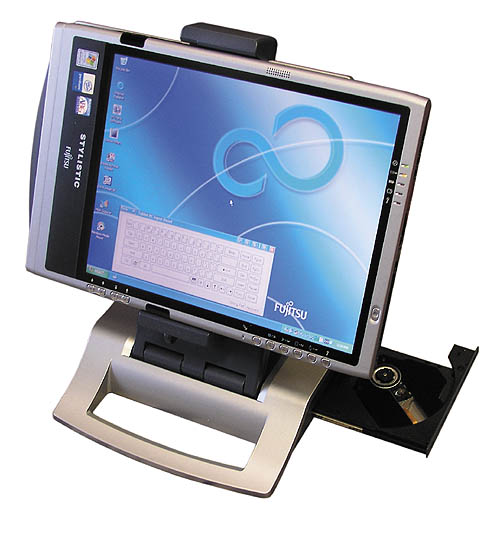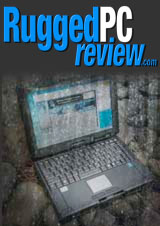|
Fujitsu Stylistic ST5000
Experience galore: Fujitsu presents its 20th generation pen slate
(by Conrad H. Blickenstorfer)
While most other Tablet PC manufacturers now have a good year of pen computing experience under their belts, the Fujitsu PC Corporation has a good decade of such experience, over 13 years, in fact. They were there from the start back in the early 1990s. The new Stylistic ST5000 represents Fujitsu's 20th generation of pen products. No one else comes close to that level of experience.
When the Tablet PC was formally introduced in November of 2002, Fujitsu unveiled the ST-4000, the latest and sleekest in a long line of Stylistic pen slates. Essentially replacing the older Stylistic 3500 for most applications, the ST-4000 was well received by Fujitsu's traditional customers, most of whom do business in vertical markets and do not have to be convinced of the merits of the slate form factor and the pen interface. Fujitsu also became the first Tablet PC manufacturer to offer a reflective screen option (see review in Pen Computing #50) for superior outdoor readability. In the middle of 2003, the T3000 notebook convertible joined Fujitsu's Tablet PC lineup, making it the only vendor to offer both Tablet PC slates and notebooks. If anything was lacking in Fujitsu's lineup it was a slate with a larger 12.1-inch screen, the kind that competitor Motion Computing had from the start. With the advent of the ST5000 that wait is now over.

More than just a big screen
The new Stylistic, however, is much more than just a ST4000 with a larger screen. It is an entirely new design that's even sleeker and more elegant than its well designed predecessor. Despite the 12.1-inch display that offers 43% more viewing area, the new model, at 12.75 x 8.65 inches, itself is barely larger than the older machine, less than an inch longer and about as wide and thick (or thin rather, at just 0.85 inches). Weight went up from 3.2 to 3.4 pounds, a barely noticeable difference. Fujitsu's engineers quite obviously did a super job packaging the bigger screen into this new model.
All-new technology
The screen, however, is not all. While Fujitsu never switched the ST4000 model to Intel's newer and more efficient M processors and stayed with the mobile Pentium III instead, the ST5000 comes with a 1GHz ULV (ultra low voltage) version of the Pentium M processor. The M processor, of course, is part of Intel's overall Centrino technology that includes processor, chipset and wireless LAN. Interestingly, while Fujitsu does use the 855GM chipset with the embedded 855GME video controller, it offers either Intel's PRO/Wireless 802.11b or Atheros' 802.11a/b/g wireless LAN circuitry. All-Intel equipped ST5000s get the coveted Centrino sticker whereas those with the Atheros radio have a "Total 802.11 ABG Atheros" sticker. Intel will no doubt soon have 802.11g support, but for now we'd pick the Atheros radio for its greater speed, especially since Fujitsu charges the same for both versions.
On the memory front, the ST5000 uses fast PC2700 333 MHz DDR RAM modules in its two externally accessible slots. Standard memory is 256MB, and that can be expanded up to 2 GB. Customers can select either a 40 or a 60GB disk, both with generous shock absorption. The two USB ports now support the much faster USB 2.0 standard. New also are a Memory Stick/SD card slot and a SmartCard slot. Excellent move! Battery power was slightly boosted from 43 to 47.5 watt-hours which Fujitsu estimates is good for up to five hours of operation. A extended battery is available as an option. It adds a couple of hours of battery life and a bit of length to the unit as the battery slides into, and represents, the side of the computer. There is a bridge battery so you can swap the main battery without powering the computer down entirely, but you do have to drop into suspend mode to do so.
Unlike convertibles, the ST5000 is designed from the ground up to be used as a slate. Icons, writing and controls would indicate that the primary orientation of the ST5000 is portrait. Holding it that way, a number of hardware buttons are placed along the right side of the display. There are also up/ down and pageup/pagedown rockers, and six function buttons--actually five buttons and one function button. Their primary functions are alt/ctl/del, starting Microsoft Outlook, toggling screen rotation, escape, and enter. Hit the function button twice and a very useful Fujitsu control panel pops up. Pressing the function key and then push one of the four buttons brings up programmable functions. The pen has its garage on the upper right, which becomes the lower left when used in landscape mode. A good location.
Durable, not rugged
Like all Fujitsu slates, this one is "durable" rather than "rugged." What this means is that the machine is well built and can take some abuse, but for extended operation in rough environments you should get one of Fujitsu's protective cases (Fujitsu offers a leather portfolio, a bump case, a harsh environment case, and a attache case). With the exception of the video connector, all ports and slots are open and exposed to the elements. There are no plugs or doors. That makes them very easily accessible, but, again, a protective case may be needed. We consider this approach reasonable.
A well connected machine
Like all Stylistics, the ST5000 offers all the connectivity most customers need on the job. Here's what the ST5000 offers in terms of interfaces: Along the left side you'll find audio in/out, two USB 2.0 ports, a Kensington-style lock, a IEEE1394 "Firewire" port, modem and 10/100/1000 LAN (yes, gigabit LAN), and video. Along the top are the Memory Stick/SD Card combo slot, the PC Card slot, and the very thin SmartCard slot that is on top of the PC Card slot. On the right is just the IR port, and along the bottom nothing at all because that is where the battery is. The backside of the ST5000 is in part covered with suede-like material, which Fujitsu claims disseminates heat and makes the device more comfortable to hold. There are user-accessible compartments that contain the wireless radio componentry and the two memory slots.
 Unlike some of the competition, Fujitsu does not offer a snap-on keyboard that doubles as a display cover. Instead, there is a cordless external keyboard (or you can use one with a USB cable). Those who use their Stylistic in the office will probably get the very functional, albeit a bit bulky, office dock. It lets you use the computer in either portrait or landscape mode, something that most others can't. And you can adjust the viewing angle. The dock also adds three more USB ports, some other ports, and, most importantly, has a media bay that can accommodate your choice of optical drive. It is essentially the same dock as was available for the ST4000 (the 4000 works in it), but it now has a fan for better airflow and cooling.
Unlike some of the competition, Fujitsu does not offer a snap-on keyboard that doubles as a display cover. Instead, there is a cordless external keyboard (or you can use one with a USB cable). Those who use their Stylistic in the office will probably get the very functional, albeit a bit bulky, office dock. It lets you use the computer in either portrait or landscape mode, something that most others can't. And you can adjust the viewing angle. The dock also adds three more USB ports, some other ports, and, most importantly, has a media bay that can accommodate your choice of optical drive. It is essentially the same dock as was available for the ST4000 (the 4000 works in it), but it now has a fan for better airflow and cooling.
Viewing angle
A word to about the larger display itself. It is definitely welcome. While most initial Tablet PCs had 10.4-inch displays, it was clear from the start that most (though not all) customers wanted a larger display. Toshiba and Motion, which had such displays, undoubtedly had an advantage there. However, there is one problem with most conventional displays in Tablet PCs: Since they were designed for use in notebooks, the have very narrow vertical viewing angles. You pretty much have to look at them head-on in order to get an acceptable picture. That's no big deal in a notebook since you can always adjust the display. In a Tablet PC things are different. That narrow vertical viewing angle turns into a much more annoying narrow horizontal viewing angle when the device is used in portrait mode. This phenomenon bedeviled all early Tablet PCs, and it is still there in the ST5000 which we believe uses the same display as the Toshiba Portege 3500 and the Fujitsu T30000 convertible. After having seen the new HP TC1100 and Sharp Actius TN10W which both use BOE Hydis displays with full 160 degree viewing angles in both directions, nothing else will ever look the same. We have no doubt that Fujitsu will eventually offer a wide viewing angle display, but it's too bad the ST5000 doesn't have one now. And speaking of displays, the ST5000 will not initially be available with a reflective display for superior outdoor readability as the ST4000 is. A reflective display option should be available in the Spring or early summer, but it will be the smaller 10.4-inch model currently used in the ST4000. Fujitsu says that the reflective technology used in the ST4000 display does not scale up well.
In terms of software, the Stylistic ST5000 comes, of course, with the Tablet PC Edition of Windows XP. It also has Microsoft OneNote, Microsoft Reader, Acrobat Reader, Drive Image SE, Zinio Reader, and the 15-function utility panel.
What about price? In years past when pen computers were vertical market-only devices, they always carried a hefty price premium. The advent of the Tablet PC Edition has driven prices down substantially. The ST5000 starts at just US$2,049, a reasonable figure if it were a consumer market device, and a downright bargain for a machine that will still primarily be deployed in vertical market applications.
I have no doubt that Fujitsu viewed the advent of the Tablet PC Edition with some trepidations as it meant new competitors and a push to lower prices. As it turned out, while adoption of the Tablet PC has been slower than Microsoft had hoped, Microsoft's endorsement and backing of pen technology has probably had a positive impact on vertical market sales, which is precisely what Fujitsu designed this superb new pen slate for. - Fujitsu: www.fujitsupc.com
|



